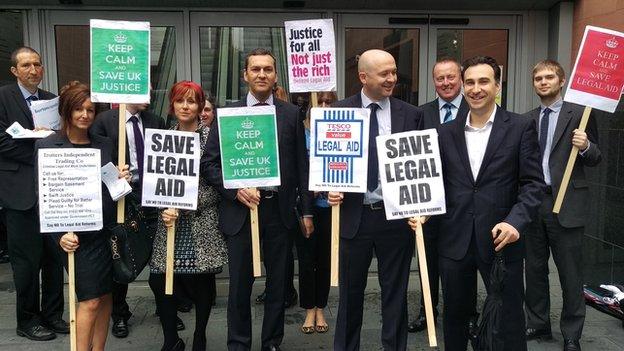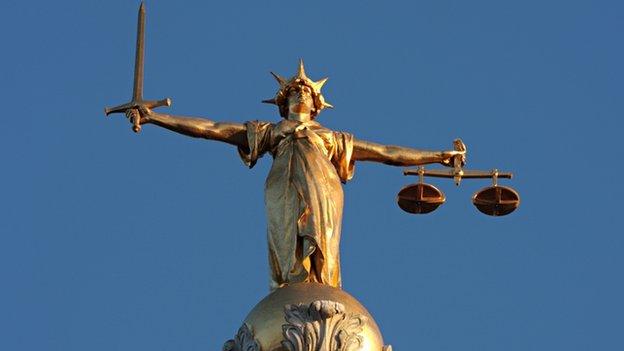Legal Aid boycott 'causing chaos'
- Published

Solicitors protesting outside Manchester and Salford Magistrates' Court
Lawyers who are boycotting legal aid work in protest against cuts say their action is causing "chaos" in some courts and police custody suites.
Court hearings have been disrupted and prisoners released from police custody before interview as solicitors have not been available, the BBC has been told.
Some solicitors stopped taking new cases seven days ago after fees were reduced, by 8.75%, for a second time.
The Ministry of Justice said courts were proceeding as usual.
Solicitors' fees in England and Wales were reduced by 8.75% from 1 July after they were cut by the same percentage in 2014.
The government is implementing cuts to reduce the £1.7bn bill for legal aid, which helps people who cannot afford the costs of legal advice.
Court delays
The Victoria Derbyshire programme attended a court case in the north of England where a number of defendants were forced to represent themselves in a hearing involving serious allegations of child sexual exploitation.
When questioned by the judge one of the accused replied, "without a solicitor I don't know what to say or what to do".
Lawyers said there have also been cases where suspects have had to be released after 24 hours because they could not be questioned in time as no legal aid solicitor could be found.
In Bristol, a preliminary court appearance of a man accused of the 1984 murder of Melanie Road, 17, had to be adjourned for three weeks due to the lawyers' action.
Christopher John Hampton, 63, has been charged with murder but has yet to enter a plea.
Bristol Crown Court, where the case was listed to appear, confirmed that the hearing had been pushed back to 28 July, "so the defendant can get some representation".
South Yorkshire Police said in its area there had been some issues but it was still assessing the scale of the impact.
A spokesman said: "We continuously endeavour to reduce the time individuals spend in custody in order to provide a more efficient service."
"Any delays in legal advice are directly contrary to these goals and the welfare of the people who ask for their service," the spokesman added.
For its part, Merseyside Police said it was experiencing "some delays" in custody suites.
A spokesman said: "However, this is being managed and the force has processes in place to cope with this demand."
'Substandard job'
Oliver Gardner of the Criminal Law Solicitors Association said 85% of lawyers had refused new work since the cuts had been introduced and their action was having a "very significant impact".
"We are hearing stories from around the country whereby people are not being represented, people are being remanded into custody, people are having decisions made in relation to cases that ordinarily if lawyers were involved those decisions wouldn't be made," he said.
"We're not prepared to put our clients - the people who need this service - at risk of miscarriages of justice by acting when we're not properly resourced and doing a substandard job. It's the government that is putting people in this position, not us."
Steve Smith, senior partner in Rotherham law firm Wilford Smith, said he and his colleagues were trying to protect the public.
"Legal Aid in its current form is going to disappear and without that a lot of people will be unrepresented," he said.
"We're talking about the future of the legal system in this country for people who do not have the funds to pay for legal representation."
'Challenging transition'
The Ministry of Justice denied that the lawyers' boycott action was having much effect.
An MoJ statement said: "The courts have been sitting as usual and the vast majority of cases requiring a solicitor at the police station have been picked up within an hour."
"Although the transition will be challenging, the changes we are pressing ahead with are designed to ensure we have a system of criminal legal aid that delivers value for money to taxpayers, that provides high quality legal advice to those that need it most, and that puts the profession on a sustainable footing for the long term.
"Having listened carefully to the case put by the profession we decided not to reduce advocacy fees, but instead to work closely with them to explore alternative ways of securing these savings."
Watch Victoria Derbyshire on weekdays from 09:15-11:00 BST on BBC Two and BBC News Channel. Follow the programme on Facebook, external and Twitter, external, and find all our content online.
- Published1 July 2015

- Published10 June 2015
